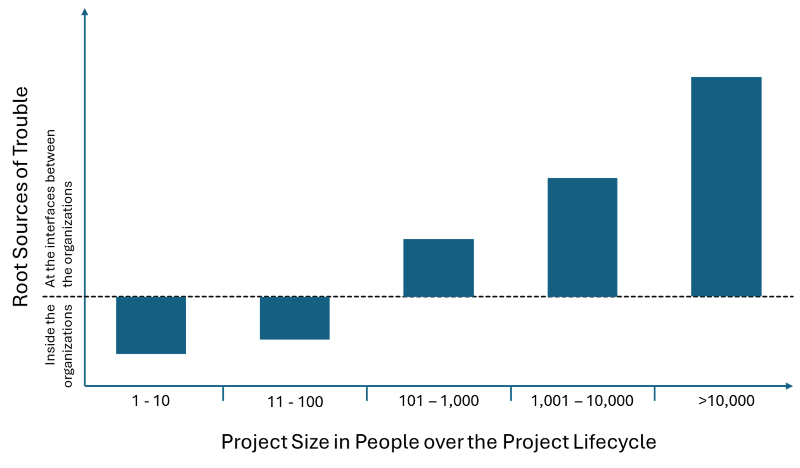Project Business Management
SERIES ARTICLE
By Oliver F. Lehmann
Munich, Germany
“Life is not about waiting for the storm to pass,
it’s about learning how to dance in the rain.”
Vivian Greene

Summary
A comprehensive study with 346 survey participants uncovered a surprising revelation for Project Business[1]: In smaller cross-corporate projects, issues more frequently originate within the individual organizations involved. However, in larger projects, these problem areas shift to the interfaces between the organizations. This underscores the critical importance of effective communication, collaboration, and mutual respect among the involved organizations in these projects.
1. Conclusion: Respect Matters
As shown in more detail further below, the study revealed a surprising insight about the fault zones in Project Business: While in smaller projects, trouble more frequently originates inside the organizations involved, the fault zone shifts in larger projects to the interfaces between the organizations.

Figure 1: Root sources of trouble change over project size (see details in Figure 7)
To some degree, this is demonstrated in the realm of Project Business by the many organizations that rightly understand how careful selection of customers and contractors is key to avoiding potential issues.
Indeed, vendors and service providers sometimes opt not to engage with certain buyers if they anticipate excessive complications outweighing the potential profits. Similarly, buyers exercise caution when choosing project contractors to prevent costly disruptions to their projects and business operations.
Regrettably, however, the dynamics of success and failure at the interfaces between organizations involved are often disregarded.
Each entity possesses distinct business interests, corporate cultures, and dominant personalities, which may not always align seamlessly. Too often, this leads to small disagreements and dissatisfaction increasing and becoming worrisome for the project and the parties involved. Then, minor disputes can escalate into substantial conflicts for the project and involved parties.
It is, therefore, imperative to prioritize a more rigorous examination of the interfaces and interactions between the parties involved in the project. This should encompass a thorough exploration of the interpersonal, commercial, and legal dimensions and the risks, but also the potential for conflicts, in these areas.
More…
To read entire article, click here
Editor’s note: This series of articles is by Oliver Lehmann, author of the book “Project Business Management” (ISBN 9781138197503), published by Auerbach / Taylor & Francis in 2018. See author profile below.
How to cite this article: Lehmann, O. F. (2024). The Fault Zones in Project Business. PM World Journal, Vol. XIII, Issue VII, July. Available online at https://pmworldlibrary.net/wp-content/uploads/2024/06/pmwj143-Jul2024-Lehmann-The-Fault-Zones-in-Project-Business.pdf
About the Author

Oliver F. Lehmann
Munich, Germany
![]()
Oliver F. Lehmann, MSc, ACE, PMP, is a project management educator, author, consultant, and speaker. In addition, he is the owner of the website Project Business Foundation, a non-profit initiative for professionals and organizations involved in cross-corporate project business.
He studied Linguistics, Literature, and History at the University of Stuttgart and Project Management at the University of Liverpool, UK, where he holds a Master of Science Degree (with Merit). Oliver has trained thousands of project managers in Europe, the USA, and Asia in methodological project management, focusing on certification preparation. In addition, he is a visiting lecturer at the Technical University of Munich.
He has been a member and volunteer at PMI, the Project Management Institute, since 1998 and served as the President of the PMI Southern Germany Chapter from 2013 to 2018. Between 2004 and 2006, he contributed to PMI’s PM Network magazine, for which he provided a monthly editorial on page 1 called “Launch,” analyzing troubled projects around the world.
Oliver believes in three driving forces for personal improvement in project management: formal learning, experience, and observations. He resides in Munich, Bavaria, Germany, and can be contacted at oliver@oliverlehmann.com.
Oliver Lehmann is the author of the books:
- “Situational Project Management: The Dynamics of Success and Failure” (ISBN 9781498722612), published by Auerbach / Taylor & Francis in 2016
- “Project Business Management” (ISBN 9781138197503), published by Auerbach / Taylor & Francis in 2018.
His previous articles and papers for PM World Journal can be found here:
[1] This article has a brief introduction to Project Business in the Appendix.









